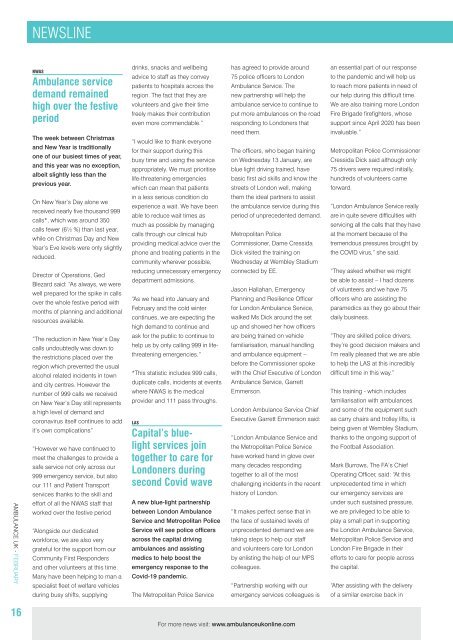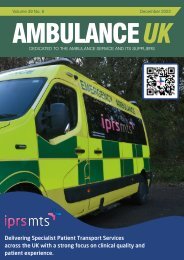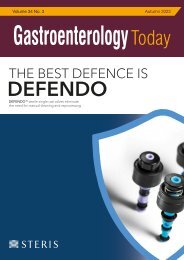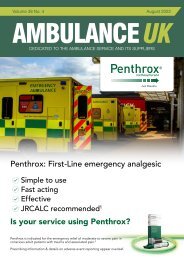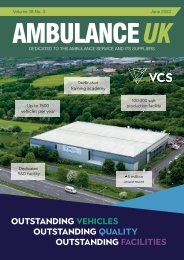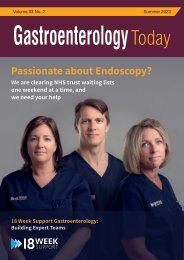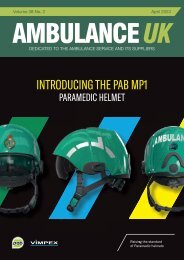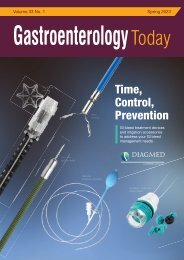Ambulance UK February 2021
Create successful ePaper yourself
Turn your PDF publications into a flip-book with our unique Google optimized e-Paper software.
NEWSLINE<br />
AMBULANCE <strong>UK</strong> - FEBRUARY<br />
NWAS<br />
<strong>Ambulance</strong> service<br />
demand remained<br />
high over the festive<br />
period<br />
The week between Christmas<br />
and New Year is traditionally<br />
one of our busiest times of year,<br />
and this year was no exception,<br />
albeit slightly less than the<br />
previous year.<br />
On New Year’s Day alone we<br />
received nearly five thousand 999<br />
calls*, which was around 350<br />
calls fewer (6½ %) than last year,<br />
while on Christmas Day and New<br />
Year’s Eve levels were only slightly<br />
reduced.<br />
Director of Operations, Ged<br />
Blezard said: “As always, we were<br />
well prepared for the spike in calls<br />
over the whole festive period with<br />
months of planning and additional<br />
resources available.<br />
“The reduction in New Year’s Day<br />
calls undoubtedly was down to<br />
the restrictions placed over the<br />
region which prevented the usual<br />
alcohol related incidents in town<br />
and city centres. However the<br />
number of 999 calls we received<br />
on New Year’s Day still represents<br />
a high level of demand and<br />
coronavirus itself continues to add<br />
it’s own complications”<br />
“However we have continued to<br />
meet the challenges to provide a<br />
safe service not only across our<br />
999 emergency service, but also<br />
our 111 and Patient Transport<br />
services thanks to the skill and<br />
effort of all the NWAS staff that<br />
worked over the festive period<br />
“Alongside our dedicated<br />
workforce, we are also very<br />
grateful for the support from our<br />
Community First Responders<br />
and other volunteers at this time.<br />
Many have been helping to man a<br />
specialist fleet of welfare vehicles<br />
during busy shifts, supplying<br />
drinks, snacks and wellbeing<br />
advice to staff as they convey<br />
patients to hospitals across the<br />
region. The fact that they are<br />
volunteers and give their time<br />
freely makes their contribution<br />
even more commendable.”<br />
“I would like to thank everyone<br />
for their support during this<br />
busy time and using the service<br />
appropriately. We must prioritise<br />
life-threatening emergencies<br />
which can mean that patients<br />
in a less serious condition do<br />
experience a wait. We have been<br />
able to reduce wait times as<br />
much as possible by managing<br />
calls through our clinical hub<br />
providing medical advice over the<br />
phone and treating patients in the<br />
community wherever possible,<br />
reducing unnecessary emergency<br />
department admissions.<br />
“As we head into January and<br />
<strong>February</strong> and the cold winter<br />
continues, we are expecting the<br />
high demand to continue and<br />
ask for the public to continue to<br />
help us by only calling 999 in lifethreatening<br />
emergencies.”<br />
*This statistic includes 999 calls,<br />
duplicate calls, incidents at events<br />
where NWAS is the medical<br />
provider and 111 pass throughs.<br />
LAS<br />
Capital’s bluelight<br />
services join<br />
together to care for<br />
Londoners during<br />
second Covid wave<br />
A new blue-light partnership<br />
between London <strong>Ambulance</strong><br />
Service and Metropolitan Police<br />
Service will see police officers<br />
across the capital driving<br />
ambulances and assisting<br />
medics to help boost the<br />
emergency response to the<br />
Covid-19 pandemic.<br />
The Metropolitan Police Service<br />
has agreed to provide around<br />
75 police officers to London<br />
<strong>Ambulance</strong> Service. The<br />
new partnership will help the<br />
ambulance service to continue to<br />
put more ambulances on the road<br />
responding to Londoners that<br />
need them.<br />
The officers, who began training<br />
on Wednesday 13 January, are<br />
blue light driving trained, have<br />
basic first aid skills and know the<br />
streets of London well, making<br />
them the ideal partners to assist<br />
the ambulance service during this<br />
period of unprecedented demand.<br />
Metropolitan Police<br />
Commissioner, Dame Cressida<br />
Dick visited the training on<br />
Wednesday at Wembley Stadium<br />
connected by EE.<br />
Jason Hallahan, Emergency<br />
Planning and Resilience Officer<br />
for London <strong>Ambulance</strong> Service,<br />
walked Ms Dick around the set<br />
up and showed her how officers<br />
are being trained on vehicle<br />
familiarisation, manual handling<br />
and ambulance equipment –<br />
before the Commissioner spoke<br />
with the Chief Executive of London<br />
<strong>Ambulance</strong> Service, Garrett<br />
Emmerson.<br />
London <strong>Ambulance</strong> Service Chief<br />
Executive Garrett Emmerson said:<br />
“London <strong>Ambulance</strong> Service and<br />
the Metropolitan Police Service<br />
have worked hand in glove over<br />
many decades responding<br />
together to all of the most<br />
challenging incidents in the recent<br />
history of London.<br />
“It makes perfect sense that in<br />
the face of sustained levels of<br />
unprecedented demand we are<br />
taking steps to help our staff<br />
and volunteers care for London<br />
by enlisting the help of our MPS<br />
colleagues.<br />
“Partnership working with our<br />
emergency services colleagues is<br />
an essential part of our response<br />
to the pandemic and will help us<br />
to reach more patients in need of<br />
our help during this difficult time.<br />
We are also training more London<br />
Fire Brigade firefighters, whose<br />
support since April 2020 has been<br />
invaluable.”<br />
Metropolitan Police Commissioner<br />
Cressida Dick said although only<br />
75 drivers were required initially,<br />
hundreds of volunteers came<br />
forward.<br />
“London <strong>Ambulance</strong> Service really<br />
are in quite severe difficulties with<br />
servicing all the calls that they have<br />
at the moment because of the<br />
tremendous pressures brought by<br />
the COVID virus,” she said.<br />
“They asked whether we might<br />
be able to assist – I had dozens<br />
of volunteers and we have 75<br />
officers who are assisting the<br />
paramedics as they go about their<br />
daily business.<br />
“They are skilled police drivers,<br />
they’re good decision makers and<br />
I’m really pleased that we are able<br />
to help the LAS at this incredibly<br />
difficult time in this way.”<br />
This training - which includes<br />
familiarisation with ambulances<br />
and some of the equipment such<br />
as carry chairs and trolley lifts, is<br />
being given at Wembley Stadium,<br />
thanks to the ongoing support of<br />
the Football Association.<br />
Mark Burrows, The FA’s Chief<br />
Operating Officer, said: “At this<br />
unprecedented time in which<br />
our emergency services are<br />
under such sustained pressure,<br />
we are privileged to be able to<br />
play a small part in supporting<br />
the London <strong>Ambulance</strong> Service,<br />
Metropolitan Police Service and<br />
London Fire Brigade in their<br />
efforts to care for people across<br />
the capital.<br />
“After assisting with the delivery<br />
of a similar exercise back in<br />
16<br />
For more news visit: www.ambulanceukonline.com


